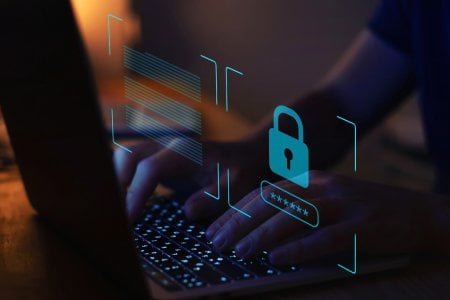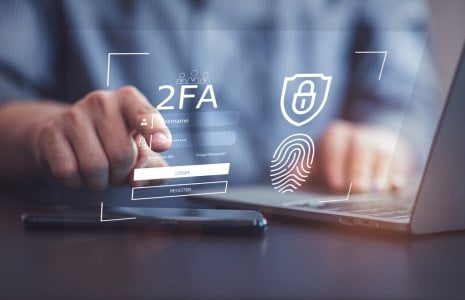Here's the secret to protecting yourself and your data from ruthless hackers
These days, the digital landscape can feel like a daunting minefield, especially if you're less tech-savvy than others. From identity theft to malware and viruses, there are so many different threats out there, and it's easy for criminals to access your personal information without you knowing it.
That's why it's crucial for everyone to be vigilant when it comes to their online safety and know the measures that they can take to make sure their data is secure.
Unfortunately, the Australian Information Commissioner’s latest report paints an alarming picture: five large-scale data breaches from July to December 2022 affected between 1 and 10 million people.
There were over 40 data breaches during this period–an increase of 67 per cent compared to the previous six months.
Thankfully, there are steps you can take to minimise the risk of falling victim to online attackers.
Techguide.com.au Editor Stephen Fenech warned against the risks associated with reusing passwords, which he said can allow hackers to access more than just your credentials–they can also gain access to other accounts and websites.
'It is not uncommon for your password to be out in the wild and potentially for your accounts to be compromised,' he said.
'If you reuse the same password, suddenly they're able to access all kinds of things,' Mr Fenech added.
Samantha Floreani from Digital Rights Watch also warned of the dangers of using the same password across multiple platforms.
‘That person can use that password and try to access different accounts,’ she told a news source.
‘So if you reuse the same password, suddenly they’re able to access all kinds of things,’ she claimed.
To check if a username or password has been hacked, you can check the website haveibeenpwned.com and enter your email into the address bar.
‘It can tell you the compromised data (like) email, addresses, passwords, password hints and usernames,’ Floreani said.
ReliaQuest's 2022 research report revealed that 24 billion usernames and passwords had been breached globally since 2016, so you must check them periodically to ensure that your data is secure.
If you’re an iPhone user, you may use the phone’s feature that alerts a user to passwords that may be compromised. You can find this in the Settings, click Password, and select Security Recommendations.
You can also take advantage of two-factor authentication, which provides a second layer of protection against any would-be hackers.
Two-factor authentication can mean a person can only access an account or website when two pieces of information, such as a password and a special code, are provided.
‘There are other two-factor authentications that also involve biometric information like your fingerprint or face ID,’ Fenech described.
He further explained, ‘It is like a second layer of protection, if your password is compromised, then your account will be compromised as well. Everyone has to do this, just having a password, unfortunately, now is not enough protection, it’s not a strong enough lock on that door.’
Here’s a tutorial on how to set up a two-factor authenticator:
We know that taking all of these precautionary steps can seem quite overwhelming, but it's essential to do them if you want to keep your data safe from cyber thieves.
For more tips and tricks on cyber security, check this article, where a former cybercriminal reveals the techniques used to steal online data.

We encourage all of our readers to take extra security measures to safeguard your personal information and devices and to never take online safety for granted!
Do you have other safety tips to share, members? Let us know in the comments below!
That's why it's crucial for everyone to be vigilant when it comes to their online safety and know the measures that they can take to make sure their data is secure.
Unfortunately, the Australian Information Commissioner’s latest report paints an alarming picture: five large-scale data breaches from July to December 2022 affected between 1 and 10 million people.
There were over 40 data breaches during this period–an increase of 67 per cent compared to the previous six months.
Thankfully, there are steps you can take to minimise the risk of falling victim to online attackers.
Techguide.com.au Editor Stephen Fenech warned against the risks associated with reusing passwords, which he said can allow hackers to access more than just your credentials–they can also gain access to other accounts and websites.
'It is not uncommon for your password to be out in the wild and potentially for your accounts to be compromised,' he said.
'If you reuse the same password, suddenly they're able to access all kinds of things,' Mr Fenech added.
Samantha Floreani from Digital Rights Watch also warned of the dangers of using the same password across multiple platforms.
‘That person can use that password and try to access different accounts,’ she told a news source.
‘So if you reuse the same password, suddenly they’re able to access all kinds of things,’ she claimed.
To check if a username or password has been hacked, you can check the website haveibeenpwned.com and enter your email into the address bar.
‘It can tell you the compromised data (like) email, addresses, passwords, password hints and usernames,’ Floreani said.
ReliaQuest's 2022 research report revealed that 24 billion usernames and passwords had been breached globally since 2016, so you must check them periodically to ensure that your data is secure.
If you’re an iPhone user, you may use the phone’s feature that alerts a user to passwords that may be compromised. You can find this in the Settings, click Password, and select Security Recommendations.
You can also take advantage of two-factor authentication, which provides a second layer of protection against any would-be hackers.
Two-factor authentication can mean a person can only access an account or website when two pieces of information, such as a password and a special code, are provided.
‘There are other two-factor authentications that also involve biometric information like your fingerprint or face ID,’ Fenech described.
He further explained, ‘It is like a second layer of protection, if your password is compromised, then your account will be compromised as well. Everyone has to do this, just having a password, unfortunately, now is not enough protection, it’s not a strong enough lock on that door.’
Here’s a tutorial on how to set up a two-factor authenticator:
We know that taking all of these precautionary steps can seem quite overwhelming, but it's essential to do them if you want to keep your data safe from cyber thieves.
For more tips and tricks on cyber security, check this article, where a former cybercriminal reveals the techniques used to steal online data.
Key Takeaways
- Millions of Australians have been impacted by data breaches, making it critical to implement cybersecurity measures.
- Between July and December 2022, there were over 40 data breaches, an increase of 67 per cent compared to the previous six months.
- 24 billion usernames and passwords have been breached globally since 2016, with hackers often trading this information on the dark web.
- Tech experts recommend two-factor authentication and checking if your data has been compromised through websites like haveibeenpwned.com. They also advised against using the same password on multiple platforms.
We encourage all of our readers to take extra security measures to safeguard your personal information and devices and to never take online safety for granted!
Do you have other safety tips to share, members? Let us know in the comments below!









